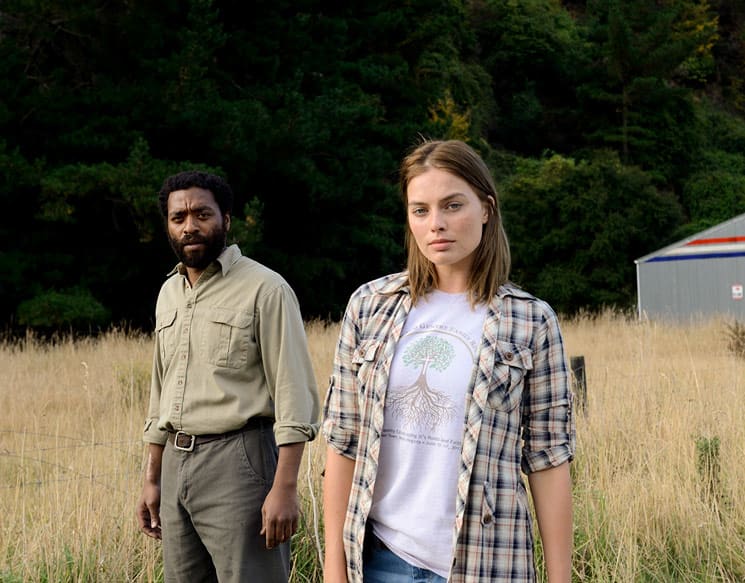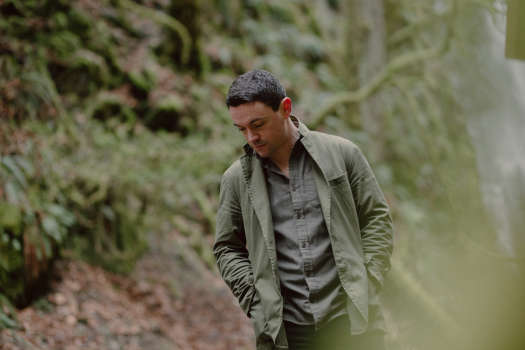If Z for Zachariah and Compliance are any indication, director Craig Zobel is very interested in exploring the human condition. He's curious about the relationship between instinct and social order, making films about people put in a compromising position of moral uncertainty; people given the opportunity to get away with something desirable, but illegal, without punishment or social judgment.
With Compliance — in which a young fast food employee accused of theft is held by her manager and strip-searched by the request of police over the phone — Zobel was more focused on the nature of order and our unflinching acceptance of a social structure, even in the face of flawed logic and ethical ambiguity. Z for Zachariah is a logical progression from this; it extracts a concept from that template — action without consequence — and dissects it sagaciously. In a post-apocalyptic world poisoned by radiation, Ann Burden (Margot Robbie) lives in what may be the only safe zone left, alone with her dog; that is, until a man named Loomis (Chiwetel Ejiofor) shows up in a containment suit.
Typically, a setup like this would be mired in misanthropic anxieties and rapidly devolve into thriller territory. In fact, that's how the young adult novel on which Z for Zachariah is based unfolds. But this adaptation is more interested in the psychological component of human relationships; it's interested in the nature of trust. Ann and Loomis, presumably being the last people on Earth, try to get along. Loomis has a vast knowledge of construction and engineering and Ann understands hunting and farming. In essence, they need each other to survive, which can be seen as a metaphor for why we, as a society, adhere to social customs and niceties.
While Zobel doesn't exploit the situation for scares or anything similarly trite, he does capture the tension of any given situations. Loomis lingers by Ann's bedroom door when he sees her bare legs and there's a sense of unease when he indulges in some leftover beer and starts behaving erratically. The knowledge that there's no support system creates potential chaos even though the majority of the film outlines what's ostensibly a considerate, mutually beneficial friendship. Even later, when Caleb (Chris Pine) shows up, giving Loomis and Ann a conflict trigger (Do they trust him or not?), Zachariah focuses more on how these people engage and interact in a mundane sense. Caleb and Loomis bond over construction planning, while Ann finds herself drawn to Caleb out of sheer ideological — religious — alignment.
While some might find this lack of action and the very subdued sense of tension dull, others will appreciate the time given to explore characters in a unique situation. What Zobel captures most effectively here are the many things that are left unsaid. We understand that Loomis is jealous of Caleb's connection with Ann, just as we understand that Ann doesn't want to acknowledge her attraction to Caleb for fear of upsetting Loomis or betraying his loyalty. Though everyone tries to behave in a manner that's considerate of each other's feelings, the knowledge that there would be no repercussions if someone were to lash out looms over everything with a danger that doesn't need to be articulated or even presented to exist.
What's perhaps most admirable about this seemingly simple little character piece is how much it leaves up to the viewer to interpret once the credits roll. As an audience with our own experience with humanity, we can draw our own conclusions, but Zobel doesn't want to spell it out. He leaves it up to us to contemplate these assumptions and what those assumptions say about us and our relationship with the existing social lexicon. There's something deeply tragic and beautiful that creeps up when all is said and done here that most filmmakers have a hard time capturing and articulating. While subtle and unassuming, Z for Zachariah is a touching work of rare insight.
(VVS Films)With Compliance — in which a young fast food employee accused of theft is held by her manager and strip-searched by the request of police over the phone — Zobel was more focused on the nature of order and our unflinching acceptance of a social structure, even in the face of flawed logic and ethical ambiguity. Z for Zachariah is a logical progression from this; it extracts a concept from that template — action without consequence — and dissects it sagaciously. In a post-apocalyptic world poisoned by radiation, Ann Burden (Margot Robbie) lives in what may be the only safe zone left, alone with her dog; that is, until a man named Loomis (Chiwetel Ejiofor) shows up in a containment suit.
Typically, a setup like this would be mired in misanthropic anxieties and rapidly devolve into thriller territory. In fact, that's how the young adult novel on which Z for Zachariah is based unfolds. But this adaptation is more interested in the psychological component of human relationships; it's interested in the nature of trust. Ann and Loomis, presumably being the last people on Earth, try to get along. Loomis has a vast knowledge of construction and engineering and Ann understands hunting and farming. In essence, they need each other to survive, which can be seen as a metaphor for why we, as a society, adhere to social customs and niceties.
While Zobel doesn't exploit the situation for scares or anything similarly trite, he does capture the tension of any given situations. Loomis lingers by Ann's bedroom door when he sees her bare legs and there's a sense of unease when he indulges in some leftover beer and starts behaving erratically. The knowledge that there's no support system creates potential chaos even though the majority of the film outlines what's ostensibly a considerate, mutually beneficial friendship. Even later, when Caleb (Chris Pine) shows up, giving Loomis and Ann a conflict trigger (Do they trust him or not?), Zachariah focuses more on how these people engage and interact in a mundane sense. Caleb and Loomis bond over construction planning, while Ann finds herself drawn to Caleb out of sheer ideological — religious — alignment.
While some might find this lack of action and the very subdued sense of tension dull, others will appreciate the time given to explore characters in a unique situation. What Zobel captures most effectively here are the many things that are left unsaid. We understand that Loomis is jealous of Caleb's connection with Ann, just as we understand that Ann doesn't want to acknowledge her attraction to Caleb for fear of upsetting Loomis or betraying his loyalty. Though everyone tries to behave in a manner that's considerate of each other's feelings, the knowledge that there would be no repercussions if someone were to lash out looms over everything with a danger that doesn't need to be articulated or even presented to exist.
What's perhaps most admirable about this seemingly simple little character piece is how much it leaves up to the viewer to interpret once the credits roll. As an audience with our own experience with humanity, we can draw our own conclusions, but Zobel doesn't want to spell it out. He leaves it up to us to contemplate these assumptions and what those assumptions say about us and our relationship with the existing social lexicon. There's something deeply tragic and beautiful that creeps up when all is said and done here that most filmmakers have a hard time capturing and articulating. While subtle and unassuming, Z for Zachariah is a touching work of rare insight.




